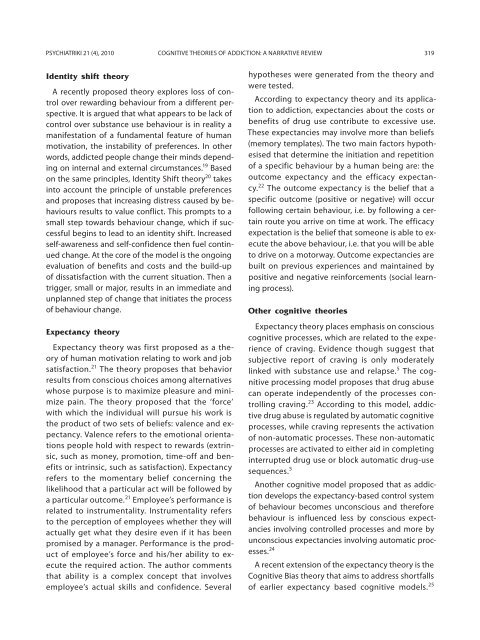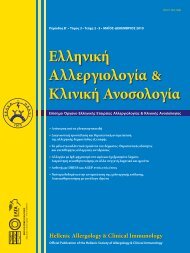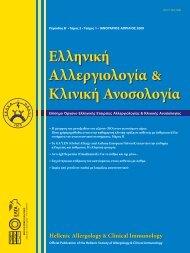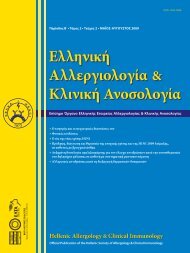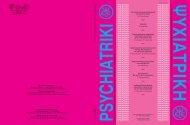318 C. Kouimtsidis PSYCHIATRIKI 21 (4), 2010Environmental variables include effects of otherpeople, interaction between individuals and situations.Theory proposes two kinds of expectationsabout self: (i) outcome expectations, which are “theperson’s estimate that a given behaviour will lead tocertain outcomes” and (ii) efficacy expectations (orself-efficacy), which refers to a person’s belief "thatone can successfully execute the behaviour requiredto produce outcomes". 14Self-efficacy regulates human functioning throughfour main processes: cognitive and motivational,which refer to purposive behaviour related to abovehypotheses, affective (stress and depression experiencedin difficult situations) and selection (of environmentand avoidance of activities believed to exceedcoping capabilities). 15 Self-efficacy is relevant toall stages and aspects of human development (familyenvironment, school, career development andpursuits, health-promoting behaviour).The theory was expanded to the Social CognitiveTheory 16 and the need to shift the paradigm of psychologicaltheories was made in order to conceivethe person as an agent of change that affects theperson and the social environment. The main agenticfeatures proposed are:i. Intentionality, which is defined as a representationof a future course of action to be performed.“These actions are performed with the belief thatthey bring desired outcomes” (outcome expectancies).“Some of these actions, though, actuallyproduce outcomes that were neither intendednor wanted”.ii. Forethought, with the exercise of which peoplemotivate themselves and guide their actions inanticipation of future events. When projectedover a longer period of time, on matters of value,a forethought perspective provides direction, coherenceand meaning to one’s life”. The role ofoutcome expectancies is central in the exercise offorethought.iii. Self-reactiveness, which refers to the concept thatan agent has to be not only a planner and forethinker,but a motivator and self-regulator as well.iv. Self-reflectiveness, which refers to the metacognitivecapability for the person to reflect upon oneself,adequacy of one’s thoughts and actions. Selfefficacyis the foundation concept of this feature.Theory of reasoned action and theoryof planned behaviourThe Theory of Reasoned Action and the theory ofPlanned Behaviour are related and take into accountthe effect of the environment in individual’s substanceuse behaviour. The theory of Reasoned Actionproposes that for volitional behaviour, a person’s intentionto perform (or not to perform) a behaviouris the immediate determinant of that action. Barringunforeseen events, people are expected to act in accordancewith their intentions. However, intentionscan change over time. Intention to act is a functionof two basic determinants: (i) the individual’s attitudestowards the behaviour (personal factor basedon positive or negative evaluation of performing thebehaviour, which is affected by expectancies beliefsregarding the outcome of the behaviour); and (ii)subjective norm (individual’s perception of the socialpressures put on him to perform or not performthe behaviour). 17The theory of Planned Behaviour is an expansionof the previous theory in order to understand thosebehaviours that a person has limited control upon.The theory makes the distinction that intentions canonly be expected to predict a person’s attempt toperform a behaviour and not its actual performance.The theory proposes that perceived control is thethird basic determinant of the behaviour. 17Self-regulation theoryAnother theory that seeks to explain how rewardseeking behaviour becomes out of control is the Self-Regulation theory, which argues that individualsself-consciously exercise their will in order to achievehealth related goals. Self-regulation involves higherprocesses overriding lower processes. 18 Self-regulationfailure occurs when lower order processes winthrough. Self-regulation theory allows for the possibleeffects of drugs of dependence on self-regulationand it also examines the effect of short-terminfluences, such as tiredness, emotional state andenvironmental stimuli on self-regulation.
PSYCHIATRIKI 21 (4), 2010 Cognitive theories of addiction: a narrative review 319Identity shift theoryA recently proposed theory explores loss of controlover rewarding behaviour from a different perspective.It is argued that what appears to be lack ofcontrol over substance use behaviour is in reality amanifestation of a fundamental feature of humanmotivation, the instability of preferences. In otherwords, addicted people change their minds dependingon internal and external circumstances. 19 Basedon the same principles, Identity Shift theory 20 takesinto account the principle of unstable preferencesand proposes that increasing distress caused by behavioursresults to value conflict. This prompts to asmall step towards behaviour change, which if successfulbegins to lead to an identity shift. Increasedself-awareness and self-confidence then fuel continuedchange. At the core of the model is the ongoingevaluation of benefits and costs and the build-upof dissatisfaction with the current situation. Then atrigger, small or major, results in an immediate andunplanned step of change that initiates the processof behaviour change.Expectancy theoryExpectancy theory was first proposed as a theoryof human motivation relating to work and jobsatisfaction. 21 The theory proposes that behaviorresults from conscious choices among alternativeswhose purpose is to maximize pleasure and minimizepain. The theory proposed that the ‘force’with which the individual will pursue his work isthe product of two sets of beliefs: valence and expectancy.Valence refers to the emotional orientationspeople hold with respect to rewards (extrinsic,such as money, promotion, time-off and benefitsor intrinsic, such as satisfaction). Expectancyrefers to the momentary belief concerning thelikelihood that a particular act will be followed bya particular outcome. 21 Employee’s performance isrelated to instrumentality. Instrumentality refersto the perception of employees whether they willactually get what they desire even if it has beenpromised by a manager. Performance is the productof employee’s force and his/her ability to executethe required action. The author commentsthat ability is a complex concept that involvesemployee’s actual skills and confidence. Severalhypotheses were generated from the theory andwere tested.According to expectancy theory and its applicationto addiction, expectancies about the costs orbenefits of drug use contribute to excessive use.These expectancies may involve more than beliefs(memory templates). The two main factors hypothesisedthat determine the initiation and repetitionof a specific behaviour by a human being are: theoutcome expectancy and the efficacy expectancy.22 The outcome expectancy is the belief that aspecific outcome (positive or negative) will occurfollowing certain behaviour, i.e. by following a certainroute you arrive on time at work. The efficacyexpectation is the belief that someone is able to executethe above behaviour, i.e. that you will be ableto drive on a motorway. Outcome expectancies arebuilt on previous experiences and maintained bypositive and negative reinforcements (social learningprocess).Other cognitive theoriesExpectancy theory places emphasis on consciouscognitive processes, which are related to the experienceof craving. Evidence though suggest thatsubjective report of craving is only moderatelylinked with substance use and relapse. 5 The cognitiveprocessing model proposes that drug abusecan operate independently of the processes controllingcraving. 23 According to this model, addictivedrug abuse is regulated by automatic cognitiveprocesses, while craving represents the activationof non-automatic processes. These non-automaticprocesses are activated to either aid in completinginterrupted drug use or block automatic drug-usesequences. 5Another cognitive model proposed that as addictiondevelops the expectancy-based control systemof behaviour becomes unconscious and thereforebehaviour is influenced less by conscious expectanciesinvolving controlled processes and more byunconscious expectancies involving automatic processes.24A recent extension of the expectancy theory is theCognitive Bias theory that aims to address shortfallsof earlier expectancy based cognitive models. 25
- Page 5: PSYCHIATRIKIQuarterly journal publi
- Page 9 and 10: PSYCHIATRIKI 21 (4), 2010 277Άρθ
- Page 11 and 12: PSYCHIATRIKI 21 (4), 2010 279Resear
- Page 13 and 14: PSYCHIATRIKI 21 (4), 2010 HOSPITAL
- Page 15 and 16: PSYCHIATRIKI 21 (4), 2010 HOSPITAL
- Page 17 and 18: PSYCHIATRIKI 21 (4), 2010 HOSPITAL
- Page 19 and 20: PSYCHIATRIKI 21 (4), 2010 287Resear
- Page 22 and 23: 290 P. TZOURAMANIS et al PSYCHIATRI
- Page 24 and 25: 292 P. TZOURAMANIS et al PSYCHIATRI
- Page 26 and 27: 294 PSYCHIATRIKI 21 (4), 2010Resear
- Page 28 and 29: 296 M. VLASSOPOULOS et al PSYCHIATR
- Page 30 and 31: 298 M. VLASSOPOULOS et al PSYCHIATR
- Page 32 and 33: 300 M. VLASSOPOULOS et al PSYCHIATR
- Page 34 and 35: 302 M. VLASSOPOULOS et al PSYCHIATR
- Page 36 and 37: 304 PSYCHIATRIKI 21 (4), 2010Resear
- Page 38 and 39: 306 H. LAZARATOU et al PSYCHIATRIKI
- Page 40 and 41: 308 H. LAZARATOU et al PSYCHIATRIKI
- Page 42 and 43: 310 H. LAZARATOU et al PSYCHIATRIKI
- Page 44 and 45: 312 H. LAZARATOU et al PSYCHIATRIKI
- Page 46 and 47: 314 H. LAZARATOU et al PSYCHIATRIKI
- Page 48 and 49: 316 C. Kouimtsidis PSYCHIATRIKI 21
- Page 52 and 53: 320 C. Kouimtsidis PSYCHIATRIKI 21
- Page 54 and 55: 322 C. Kouimtsidis PSYCHIATRIKI 21
- Page 56 and 57: 324 PSYCHIATRIKI 21 (4), 2010Specia
- Page 58 and 59: 326 B.J. HAVAKI-KONTAXAKI et al PSY
- Page 60 and 61: 328 B.J. HAVAKI-KONTAXAKI et al PSY
- Page 62 and 63: 330 B.J. HAVAKI-KONTAXAKI et al PSY
- Page 64 and 65: 332 PSYCHIATRIKI 21 (4), 2010Genera
- Page 66 and 67: 334 C.I. Istokoglou et al PSYCHIATR
- Page 68 and 69: 336 C.I. Istokoglou et al PSYCHIATR
- Page 70 and 71: 338 C.I. Istokoglou et al PSYCHIATR
- Page 72 and 73: 340 PSYCHIATRIKI 21 (4), 2010• 10
- Page 74 and 75: SUBMISSIONPapers either in English
- Page 76 and 77: ΥΠΟΒΟΛΗ ΕΡΓΑΣΙΩΝΟι
- Page 78: ΣΥΝΟΔΕΥΤΙΚΟ ΕΝΤΥΠΟ


